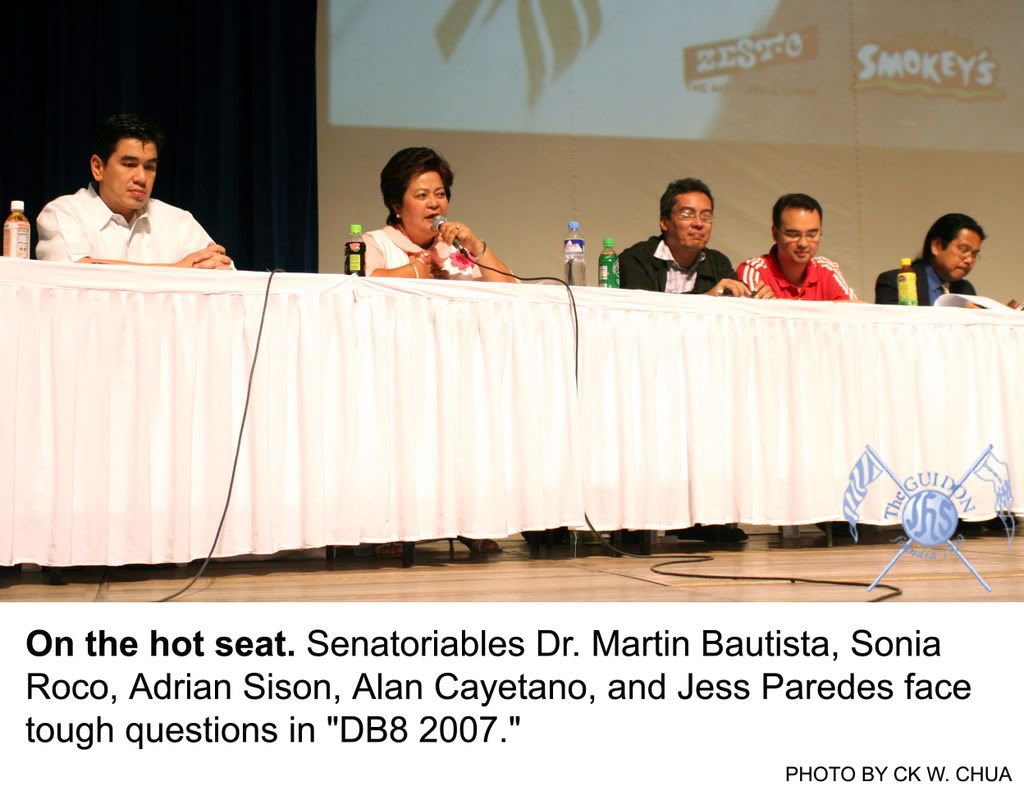
THE BUZZ outside Irwin Theater on April 25 was proof enough—more than the senatorial debate there earlier that day—that the youth vote is a thinking vote.
The debate, titled “DB8 2007,” aimed to educate first-time voters as a response to Chief Justice Reynato Puno’s call for the youth to “make a decisive difference on the outcome of the coming elections.”
The senatoriables who attended the debate were Ang Kapatiran’s Martin Bautista, Jesus Paredes, and Adrian Sison, and the Genuine Opposition’s (GO) Alan Cayetano and Sonia Roco. Team Unity (TU) candidates were a no-show.
The event was organized by the Jaycees International Senate, the University of the Philippines Debate Society (UPDS), and the Ateneo Debate Society (ADS).
Knowing candidates
Lilia Seelin, former Jaycees president and one of the organizers, was glad that the young audience had their own opinions on the debate, which touched on issues like globalization and birth control.
The topics even found their way into the students’ conversations after the event.
Leloy Claudio (AB Comm ’07), a former student debater, said that he wanted to react the most to Paredes’s opinion on birth control. Running under a platform of “God-fearing leadership,” Paredes said that Ang Kapatiran is against artificial family planning, and goes for the Church-endorsed natural methods.
Claudio, the valedictorian of his graduating class, said that in a secular context, such a Church view cannot be imposed. “I was pretty upset at the way Kapatiran dealt with family planning, although I have to admit that they’re still a better alternative compared to most of the politicians out there.”
Meanwhile, students from the
“There’s a thing about having public service in your blood,” Cayetano said. “The question is whether the public official serves the country or only himself.”
UP education
Roco, a teacher by profession, was asked by UP student debater Maria Theresa Grajo, another moderator, if the State should continue funding tertiary education.
Roco answered, “Subsidies should not stand forever; people should be able to stand on their own.” While noting that UP’s funding is different from that of other state colleges and universities—UP gets a bigger budget, for example—Roco said that the Senate should look more deeply into how UP is being managed.
Addressing the budget problem, Bautista called for the repeal of the Automatic Appropriations Act, which automatically allots a large chunk of the national budget for debt payment.
“We put 1% to health care, 11% to education, 28% to interest payments alone. I find this totally immoral,” he said.
Team Unity’s absence
Notable was how the Ang Kapatiran trio, who have performed poorly in surveys, caught the students’ attention.
“After the debate, I got to know Ang Kapatiran,” said Linette Arreola, a junior from UP-Diliman. “They would certainly have a spot in my ballot.”
Clark Cue (IV BS ME), president of the Council of Organizations of the Ateneo (COA), had a similar opinion, noting that he didn’t even consider the Kapatiran candidates in the mock elections before the debate. “After hearing them, I think I would consider the three of them. Maganda ang mga sinabi nila (Their speeches were good)."
On the other hand, many were disappointed with the absence of administration bets.
Seelin explained that whereas with GO candidates, the problem was only with conflicting schedules, “with Team Unity, we really had a problem getting them.”
Claudio added, “I think it just shows the lack of transparency or accountability of this government to the most critical sector of society, which is the youth.”

